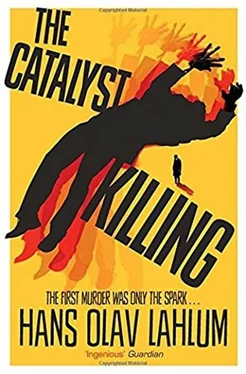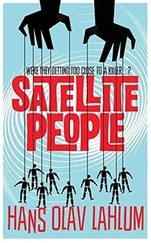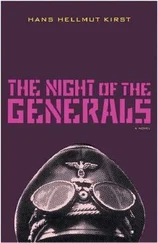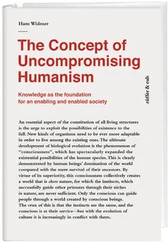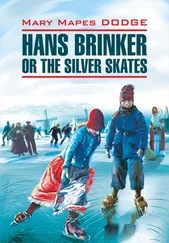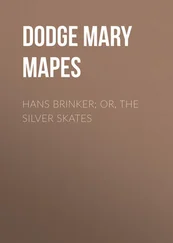I held the photograph up in front of him and asked how this fitted with his previous statement that he had not seen Henry Alfred Lien since the war.
I had thought that Christian Magnus Eggen would have coordinated his explanation with that of Frans Heidenberg. But instead he chose another strategy.
‘This very personal photograph, which you have somehow or other managed to get hold of, simply shows that I have gone to a restaurant with other people. And as far as I know, that is still legal, even here in Norway. I have not registered any new exemption laws that forbid people from eating in restaurants, and they would no doubt have been reported in Morgenbladet and Aftenposten. I do not see any connection between this picture and any criminal activities that have gone on either this summer or before. If you are investigating the murder of that young communist woman, it is hard to see how a photograph of four elderly men in a restaurant could possibly be of any relevance. Or perhaps you can explain it to me?’
I replied that it was I who was there to ask questions and that it would not be in his favour if he refused to answer these in an ongoing investigation. This did not humour him in any way.
‘In that case you will have to present it before a judge and see if there is strong enough evidence for you to summon me as a witness. In the meantime, I have no desire to give any information to you, the police or anyone else about which friends I see and when.’
I made a final attempt and asked if he could give me a more detailed description of the person who was unidentifiable in the picture. It could well be of even more interest to check him out of the case than Eggen himself.
‘I could, but I do not want to. And what is more, I do not want to prolong this conversation with you any more.’
Christian Magnus Eggen’s eyes shone with an almost childlike defiance when he said this. I understood then and there that his hatred for society that had been building over the years had now found an outlet, and was directed at me.
I ventured to remind him that when a young person was murdered, the parents and other close friends and relatives were left bereft.
He seemed taken aback by this. He leaned heavily on his stick for a few moments, then sank down into a chair in the hallway. His voice was suddenly grave and sad when he spoke again. But it had not lost any of its intensity or speed.
‘I know absolutely nothing about the murder you are investigating and have nothing to say that might help those left behind. But I have to say that my sympathy for the parents of murdered communists is somewhat limited. Which might perhaps have something to do with the fact that my only son was shot by the communists in the war.’
Christian Magnus Eggen now seemed to be both upset and tired at once. He gasped for air a couple of times and then continued.
‘And as you mentioned those left behind, parents and children, let me tell you about another old murder… My friend Frans may well have already told you that his fiancée had disappeared when he got out of prison after the war. But he is such a considerate person that he perhaps did not mention the child?’
I shook my head and sent him a piercing look. He took a deep breath and carried on.
‘Frans’s perfidious fiancée was pregnant when he was arrested – in the fourth month, no less. According to the law of the day, killing a foetus was a crime, even in Norway. But that did not prevent the death of Frans’s only child while he was being held on remand, with the help of both the police and the health service. Frans and I have paid our taxes for decades and have had to take care to uphold all kinds of strange laws, but have never had any rights ourselves, not even to our children’s lives. So you might perhaps try to understand why, today, we are not particularly cooperative with the police and do not feel much sympathy for those left behind by communists. And now it may well be best for us both if you just leave me in peace!’
I gave a short nod to this as I turned on my heel and walked away. It was now twenty to eleven, and I would soon be very short of time to make my meeting with the prime minister. But I had got an interesting glimpse of the bitter person behind Christian Magnus Eggen’s mask, and I did feel a smattering of understanding for both him and Frans Heidenberg. I had also lost all my illusions of what these bitter and lonely old men might be capable of doing in relation to a society they felt had let them down, and that they hated with a vengeance.
I was becoming increasingly curious and worried about the mysterious fourth man. I left the photograph lying on the passenger seat where I could see it, and studied it at every traffic light. There was still not much to be had. Both Frans Heidenberg and Christian Magnus Eggen had indicated that he was an older man, around their age. But the photograph did not prove or disprove this. The only lead was a right hand with no wedding ring or any other form of visible distinction. It could, in theory, as easily belong to a twenty-year-old as to a seventy-year-old.
It did feel as though I had touched on something significant that morning. But what exactly it was, I still could not say.
I had to use my blue light for the last part of the journey in order to get to the meeting on time. At one minute to eleven, I stood for the first time at the door of the prime minister’s office.
The office was smaller than I had imagined. A very correct secretary asked me to go straight into the prime minister’s personal office. And when I went in, the prime minister was sitting alone at his simple desk.
Even though I, as a city lad, had never considered voting for the Farmers’ Party, or the Centre Party as they were now called, I had considerable sympathy for the down-to-earth farmer, Peder Borgen. This was in no way diminished by meeting him. In sharp contrast to the representative for the royal family’s security service, Norway’s prime minister stood up and shook my hand heartily.
I knew only too well that the prime minister was facing a very demanding autumn and winter. It was widely acknowledged that growing disagreement between parties in the coalition government would soon come to a head in the debate about Norway’s position regarding the Common Market. My father, who had a good nose for politics, and also good contacts in several parties, had expressed several times this summer his belief and hope that the government would fall apart in good time before Christmas. And any avid newspaper reader could see that following their good results in the autumn elections, the Labour Party was now putting on the pressure in the Storting and preparing to take over the reins very soon. Given all this, the prime minister seemed to be remarkably relaxed and calm.
I began by remarking that I would not take up more of his time than strictly necessary. He replied, however, that he had nothing special that had to be done today, and that he would like to hear what I had to tell about the case.
My plans for a brief ten-minute orientation soon went out the window, but through no fault of my own. The prime minister interrupted me repeatedly with the strangest detailed questions about the facts of the case and my thoughts on them. It took a full forty minutes before we were finished. The prime minister remained calm when I spoke of the danger of an attack or sabotage and explained that it might, in the worst-case scenario, involve him or other members of the government.
When I asked about his public engagements over the next few days, he conferred briefly with his secretary and then said it was quieter in summer and he had no official engagements today, whereas the next day he was giving a talk at a Norwegian Farmers’ Union seminar and then was doing the honours at the official opening of a small national park at six.
Читать дальше
